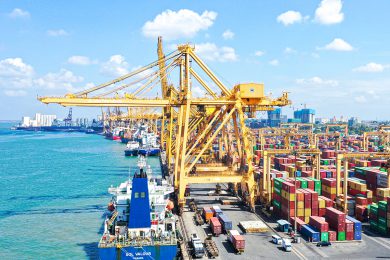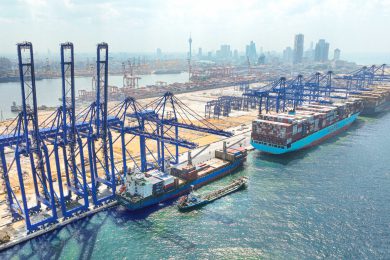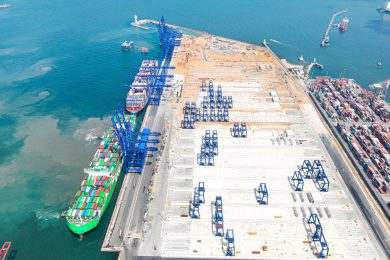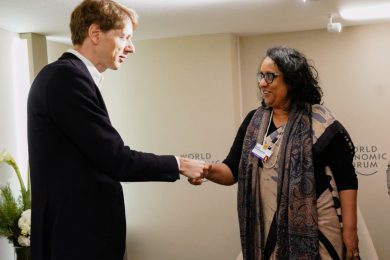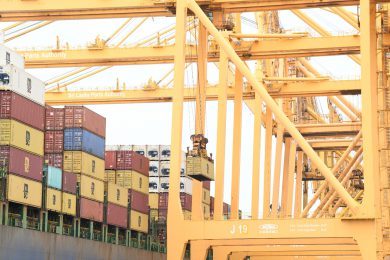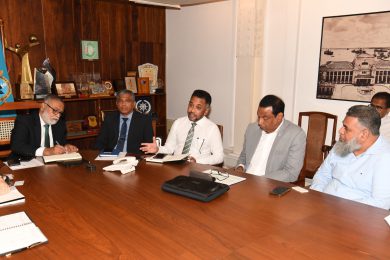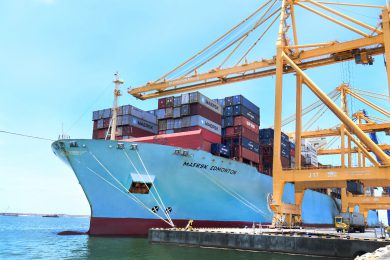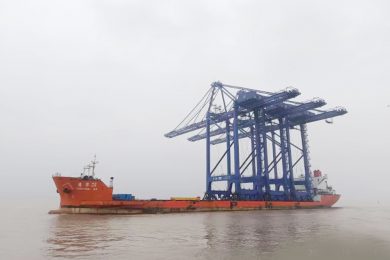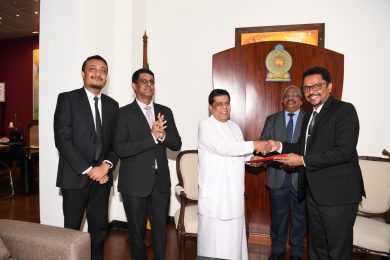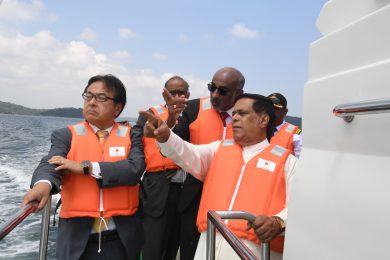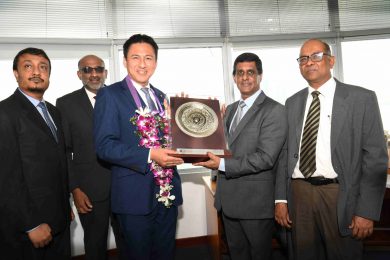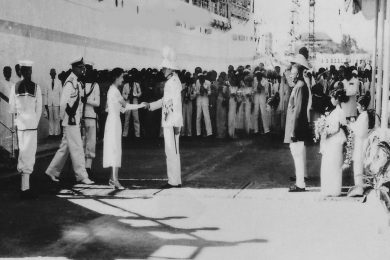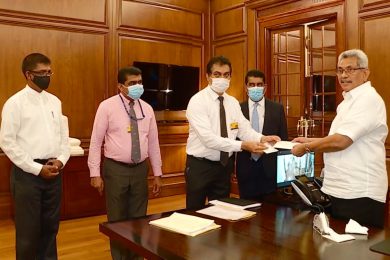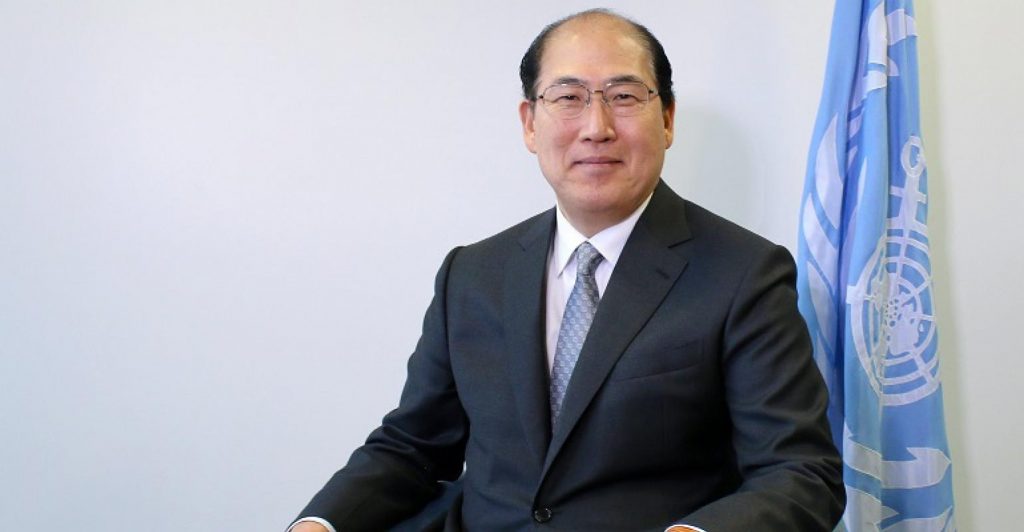An Exclusive Interview with Kitack Lim Secretary-General, International Maritime Organization (IMO)
by Nilantha Ilangamuwa
Novel coronavirus outbreak is influencing the shipping industry, though, Wuhan, the epicentre of the deadly virus outbreak, has less influence on seaports in China. China is not only the leading biggest ports and terminals in the world but also the biggest manufacturer on the planet. Consequently, the global market and supply chain will have to pass yet another grim period.
However, this is not the first time the industry is challenged. Despite all debacles throughout history, the shipping industry is rapidly growing while emerging new market needs. As reports suggesting the International shipping transports more than 80 per cent of global trade to peoples and communities all over the world.
In this exclusive interview, the Secretary-General of the International Maritime Organization (IMO), Mr Kitack Lim explained the emerging trends and strategies to overcome challenges in the shipping industry. As a specialized agency of the United Nations, IMO is the global standard-setting authority for the safety, security and environmental performance of international shipping. Mr Kitack Lim was elected Secretary-General of the IMO in 2015 and he was re-elected for a second and final term of four years in January this year. Hailed from South Korea Mr Kitack Lim is the eighth elected Secretary-General of the International Maritime Organization. Please note that this interview was conducted a few weeks before the Covid019 outbreak.
Following are the excerpts of the interview;
Question: Mr. Lim, congratulations for your reelection as the IMO’s Secretary-General and thank you for accepting my request to have this interview. Prior to your appointment as the IMO’s Secretary-General, you have earned strong experiences by working with various institutes and agencies. Tell us the importance of robust state policies and how they can help to improve and enhance the quality, efficiency and reliability of maritime industry?
Answer: Thank you! The starting point for this has to be the comprehensive framework of treaties adopted by IMO. Countries which implement all these treaties into national law and enforce them have a solid basis for ensuring the shipping sector is safe, environmentally sound, secure, efficient and sustainable. Only through this universally applied international framework, will we be able to achieve the level playing for the truly global maritime industry and make it ever safer, cleaner, more secure and sustainable.
A solid framework needs to be established at national level. Through my experience working in the Korean Maritime Administration as well as President of the Busan Port Authority, I believe that Member States all have the capability to achieve this through the introduction of robust approaches.
For example, ensuring that the discussion and conversions at IMO are supported by the adequate technical personnel representing all relevant parts of the maritime administration. It is of utmost importance for all Member States to actively participate in the deliberation at IMO, to bring their expertise and experience, particularly when it comes to the effect and implementation challenges which may be faced establishing the necessary national procedures.
In addition, the scope of considerations at IMO is increasing. In the past, you could say that the topics were mainly of concern to transport and maritime administrations. Nowadays, matters like the Initial IMO GHG Strategy, the global sulphur limit, and Illegal, unreported and unregulated fishing require the involvement of ministries governing environment, agriculture, oceans and fisheries. It is crucial to establish national cooperation and exchange of information mechanisms between all relevant entities, to coordinate the work atIMO, providing a harmonized approach for each country when addressing the same issues at different international fora. Many issues and challenges currently discussed at, for example, other UN agencies, will impact on the maritime sector, and one specific example is the world’s oceans agenda.
The increased correlation of the global issues currently impacting on the maritime industry also requires enhanced efforts by each national administrations represented at IMO, to ensure that the topics discussed at IMO Headquarters are always brought to the attention of high-level officials. It is important to communicate the work being carried out at a high level from the outset, in order to guarantee a buying-in scenario of the future measures from the beginning, paving the way for the provision of the necessary resources and political support to achieve the expected goals.
From an implementation viewpoint, I also encourage the development of national maritime transport policies (NMTPs). This kind of policy is a statement of principles and objectives to guide decisions in the maritime transport sector with a view to achieving the maritime vision of a country and ensuring that the sector is governed in an efficient, sustainable, safe and environmentally sound manner.
IMO has been assisting developing countries in formulating and enhancing their NMTPs, through a training package on the development, adoption and update of NMTPs. The training package was developed in close cooperation with the World Maritime University (WMU) and has already been successfully delivered in a number of countries. I had the opportunity to study at WMU and I will continue to promote further education for all those involved in the maritime cluster; we should not just learn but share our knowledge and experience with others.
Q: The global maritime community just celebrated the annual World Maritime Day, under the theme “Empowering Women in the Maritime Community”. IMO has been running a highly successful campaign to promote women in the maritime community for more than 30 years. What are the positive achievements in your mission?
A: First, let me say that the 2019 IMO World Maritime Theme “Empowering Women in the Maritime Community” really helped raise awareness of the importance of gender equality. It highlighted the important – yet under-utilized – contribution of women within the maritime sector. Many maritime stakeholders enthusiastically took up the theme at numerous seminars, conferences and panel discussions.
Throughout the year, IMO worked with various maritime stakeholders to help create an environment in which women are identified and selected for career development opportunities in maritime administrations, ports and maritime training institutes; and to encourage more conversation for gender equality in the maritime space.
IMO’s Women in Maritime programme pushed forward with numerous activities, including premiering a new film, launching online profiles of women in the maritime sector and providing support to the Women in Maritime Associations (WIMAs) launched through the programme.
At the end of 2019, the IMO Assembly adopted a resolution urging further firm action in coming years to advance gender equality throughout the maritime sector and reach a barrier-free environment. A number of actions can help progress towards gender equality, and these are highlighted in the resolution.
They include addressing any barriers and obstacles that still exist and fostering a safe environment for women in the maritime sector. We need more sharing of best practices in achieving gender equality. And we need more data. We need to collect, consolidate and analyse data relating to the participation of women in the maritime sector, to establish baselines, identify gaps and inform policies aimed at removing barriers and increasing female participation in the sector. I am pleased to say that IMO and the Women’s International Shipping & Trading Association (WISTA International) have initiated a study to establish numbers of women employed across several maritime sectors.
We also need to continue to encourage open dialogue and wider engagement between the IMO Member States and observer delegations.
I am positive that we can continue the momentum of 2019 and continue to push forward to create a barrier-free environment for women – and help facilitate the achievement of the global Sustainable Development Goal (SDG) 5 on gender equality.
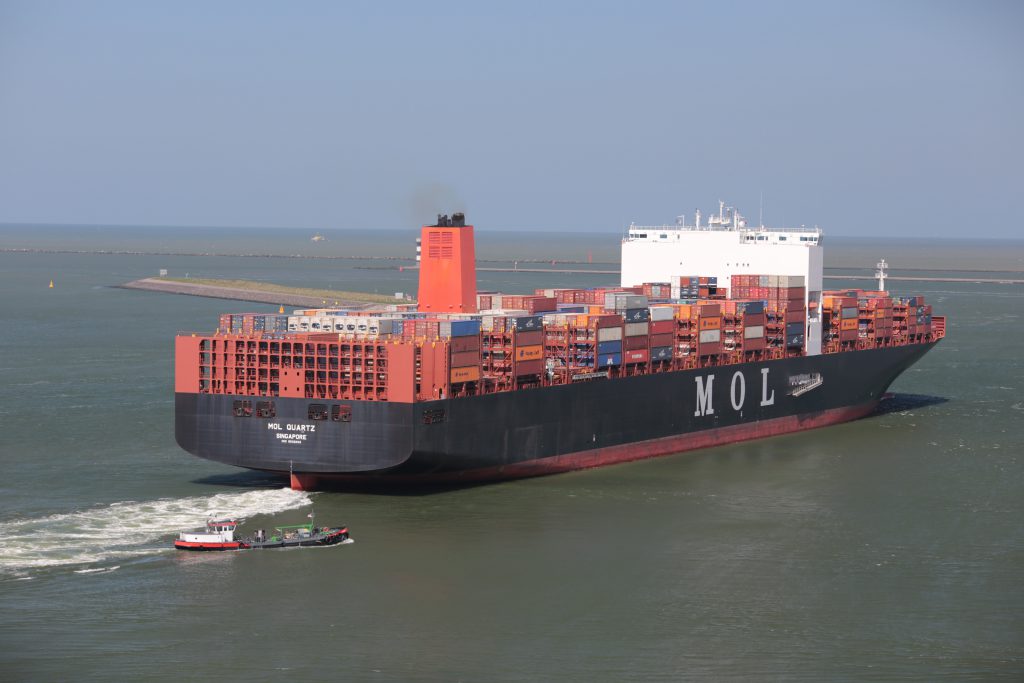
Q: What are the challenges you are trying to overcome in empowering women in the maritime industry?
A: The maritime industry is, by and large and historically, male dominated. So this means there can be cultural and traditional forces at play which can make it harder for women to advance.
Some challenges may be practical, but these can be easily overcome, for example by ensuring suitable training berths on ships for women and appropriate sanitation facilities.
Other challenges may be about cultural issues or perceptions, but again these can be overcome through enhancing the visibility and recognition of women. If young women see female role models in the industry, they will be encouraged to pursue careers in the sector. The maritime industry needs talented people and should not exclude half the population.
This is why IMO’s Women in Maritime programme works under the slogan “training-visibility-recognition”, supporting the participation of women in both shore-based and sea-going posts and the empowerment of women through gender specific fellowships; by facilitating access to high-level technical training for women in the maritime sector in developing countries; by creating the environment in which women are identified and selected for career development opportunities in maritime administrations, ports and maritime training institutes; and by facilitating the establishment of professional women in maritime associations, particularly in developing countries.
I am optimistic that together, involving all stakeholders, we can work to overcome challenges and see barriers and obstacles removed for a fairer and more diverse industry.
Q: In your recent speech you have pointed out that, “Global seaborne trade is constantly growing, with annual growth rates of around 3 to 4% expected in the next years. Given these expectations, shipping must constantly adapt to new trends developments and challenges to achieve economic sustainability.” What are the strategies the industry could apply to adopt them smoothly?
A: These are challenging times for trade, with impacts from trade tensions, geopolitical situations, and other disruptions. Shipping needs to plan ahead and be adaptable and flexible. The key to adapting to a changing environment and to be able to apply the trends, developments in the maritime sector is cooperation and collaboration.
And this applies in particular to the major issues that will impact the maritime industry in the next decades:
• First: addressing GHG emissions from ships. With the adoption of the Initial IMO Strategy on the reduction of GHG emissions from international shipping in 2018, there is a clear commitment to a complete phase out of GHG emissions from ships, a specific linkage to the Paris Agreement and a series of clear levels of ambition including at least a 50 per cent cut in emissions from the sector by 2050. In real terms, this represents a real reduction of emissions of over 80% for ships currently trading at sea, which signals the real progress towards decarbonisation of the shipping industry.
All IMO Member States deserve enormous credit for their spirit of collaboration and dedication throughout the process, as do the many IGOs, NGOs and the maritime industry for their constructive participation and cooperation. The focus now has turned into detailed work on achieving these ambitions, and this work will continue in 2020 and beyond.
Research and development will be crucial, as the targets agreed in the IMO strategy will not be met using current fossil fuels. There is a need to make zero-carbon ships more attractive and to direct investments towards innovative sustainable technologies and alternative fuels.
• Second: Digitalization. I would say that digital disruption has already arrived in the shipping world. Advancements in technologies such as robotics, automation and big data will usher in structural changes. Fully autonomous ports and semi-autonomous ships are already close to becoming a reality in some countries. And a key strategic direction for IMO is the integration of new and advancing technologies in the regulatory framework – balancing the benefits derived from these technologies against safety and security concerns, the impact on the environment and on international trade facilitation, the potential costs to the industry, and their impact on personnel, both on board and ashore.
As such, IMO is currently working on a comprehensive scoping exercise into maritime autonomous surface ships, also known by the acronym MASS, looking into how safe, secure and environmentally sound their operations may be covered in IMO instruments.
• Third: Efficiency of shipping. We are also looking at strengthening our work to make shipping a more integrated and more efficient part of the global logistics chain. Under the revised FAL Convention, it became mandatory for ships and ports to exchange data electronically from April 2019 – preferably using the so-called “single window” concept. In the years to come, I believe this will help ships pass more efficiently in and out of ports from the administrative perspective, something IMO has been increasingly keen to support and promote.
In this regard, one of my priorities for IMO is to enhance cooperation and communication between shipping, ports and logistics. This is vital to enhance the efficiency and sustainability of shipping and therefore facilitate trade and foster economic growth and prosperity.
We must work to ensure that technologies which increase connectivity and efficiency of working practices in maritime transport are adopted; be it in marine communications or the exchange of information; through approaches like the maritime single window or in ship-to-ship as well as ship-to-shore interfaces.
This is all part of IMO’s strong commitment to addressing the rise of digitalization and automation in the maritime industry, in order to enhance the efficiency and sustainability of shipping.
Q: Many discussions are focusing on safer, smarter, and greener for a sustainable maritime sector. Can you outline the strategy the IMO is advocating to implement to reduce shipping emissions of greenhouse gases by 50% by 2050 compared to 2008? And what are the responses you have received from the organizations in the industry?
A: As mentioned already, the Initial IMO Strategy on reducing GHG emissions from international shipping was adopted in 2018, with ambitious targets.
The international shipping sector organizations which hold consultative status at IMO have been responsive, providing significant input to the discussions on achieving the targets IMO has set. It is important that all stakeholders are involved in the relevant IMO fora. We have extremely high levels of participation from Member States and non-governmental organizations in all fora, and that is very encouraging.
We also see support from the industry through the Global Industry Alliance to Support Low Carbon Shipping (GIA), which was launched by IMO in 2017. The GIA is a public-private partnership initiative that brings together maritime industry leaders to support an energy efficient and low carbon maritime transport system. Leading shipowners and operators, classification societies, engine and technology builders and suppliers, big data providers, oil companies and ports have joined hands under the GIA to collectively identify and develop innovative solutions to address common barriers to the uptake and implementation of energy efficiency technologies and operational measures.
I also particularly welcome the commitments made by the maritime sector, including those involved in the Getting to Zero Coalition of more than 90 companies within the maritime, energy, infrastructure and finance sectors. The coalition pledges to develop and deploy commercially viable deep sea zero emission vessels by 2030. And I also commend the signatories to the Poseidon Principles, which establish a framework for assessing and disclosing the climate alignment of ship finance portfolios as well as other initiatives to reduce GHG emissions from shipping.
Q: The United Nations have issued a warning report on the condition of the ocean due to climate change, recently. What is your message to policymakers of each country and stakeholders of the maritime industry around the globe?
A: My message is that we need to all work together to address the threats to our oceans. We need to deliver tangible and concrete action – to ensure our strategies, plans and roadmaps are achieved. I am confident that, together, we can succeed.
Our oceans are under threat from climate change, but also from pollution and overfishing. Even though we have already adopted regulations to protect the discharge of damaging substances and wastes, including plastic litter, into the sea, we need to all accept that more has to be done.
IMO has initiated and made considerable progress on the issue of marine plastic litter from ships, in particular with the adoption of an action plan on marine litter. IMO and the Food and Agriculture Organization of the United Nations (FAO) have launched a GloLitter Partnerships project, with initial funding for the project from the Government of Norway. IMO has also been an active member of the Global partnership on marine litter (GPML), coordinated by the UN Environment Programme (UNEP), to reduce marine litter from both land and sea.
The GloLitter project aims to help shipping and fisheries move to a low-plastics future and will assist developing countries to identify opportunities to prevent and reduce marine litter, including plastic litter, from within the maritime transport and fisheries sectors, and to decrease the use of plastics in these industries, including identifying opportunities to re-use and recycle plastics.The project will consider the availability and adequacy of port reception facilities; look at enhancing awareness of the marine plastics issue within the shipping and fisheries sectors, including seafarers and fishers; and encourage fishing gear to be marked so it can be traced back to its owner if discarded.
Our focus on the oceans has also been seenin in our work to promote the entry into force of the Cape Town Agreement on fishing vessel safety, which would also contribute to preservation of the marine environment. Having in place a global regime for fishing vessel safety and enabling effective port State control will help tackle illegal, unregulated and unreported (IUU) fishing. In October 2019, IMO hosted, with the Government of Spain, a Ministerial Conference on fishing vessel, safety and IUU fishing, in Torremolinos, Spain which resulted in some 50 countries pledging to ratify the Cape Town Agreement by 2022 and bring it into force.
In June 2020 we will be participating in the 2020 United Nations Ocean Conference in Lisbon, Portugal. I look forward to sharing IMO’s work on protecting the oceans and learning from others on how we can all together support further action to conserve and sustainably use the oceans, seas and marine resources.



